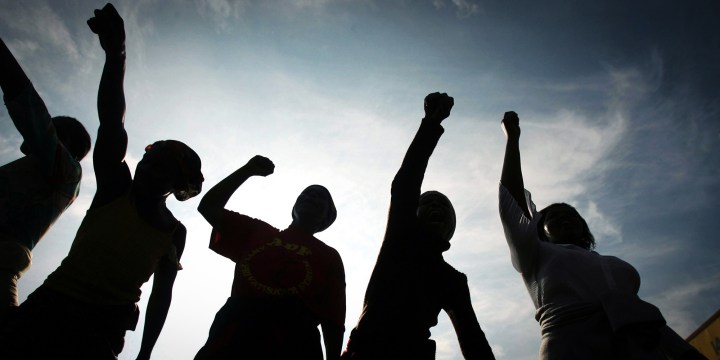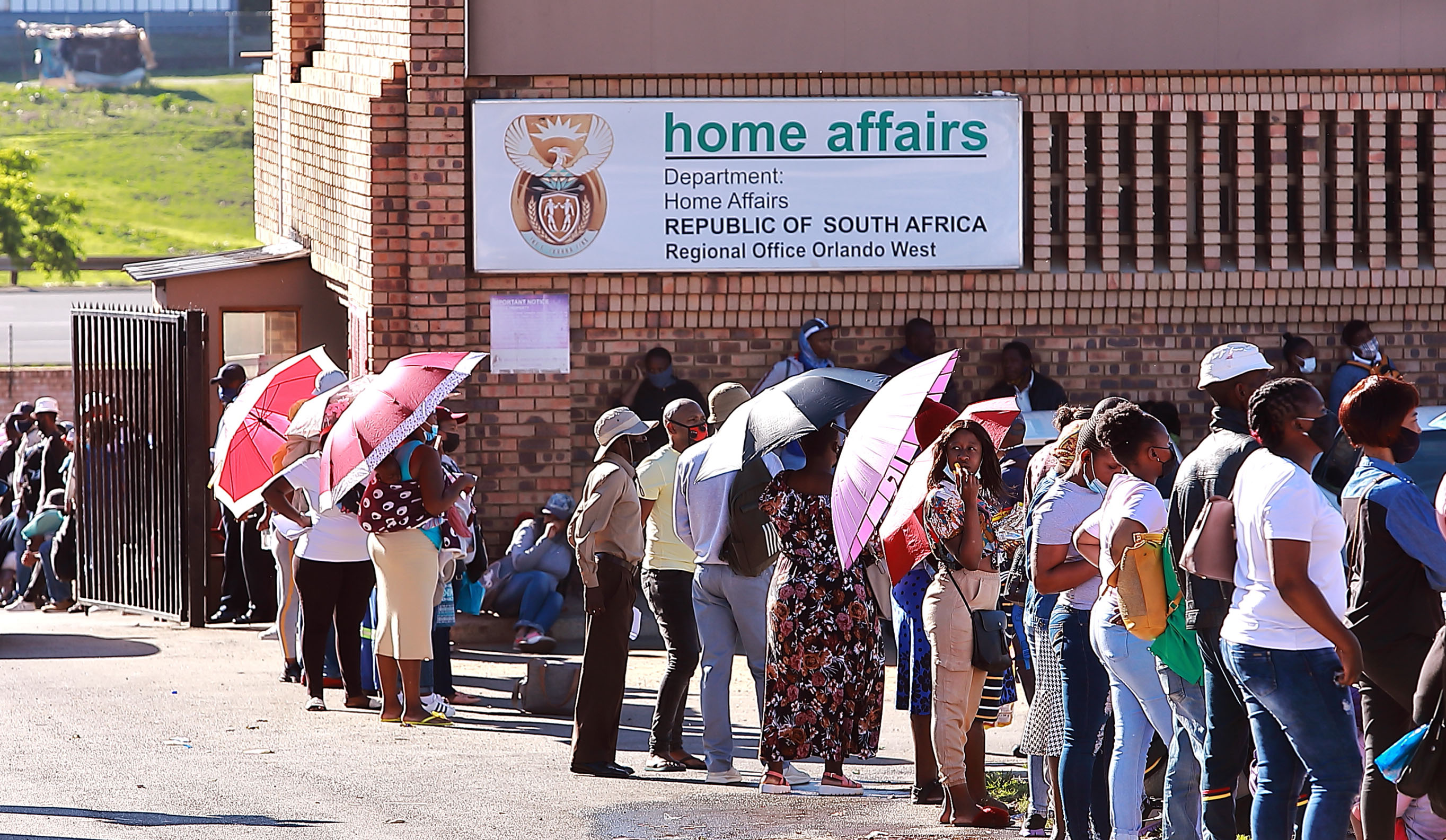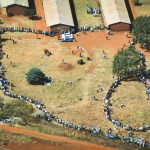TUESDAY EDITORIAL
Maverick Citizen’s tip for 2023 – get involved in 18 months of activism for democracy and service delivery

‘Make 2024 our 1994,’ said a young person on an activist WhatsApp group recently.
They are right. As the social crisis in South Africa deepens, many eyes are already on the general election in 2024. But to get to 2024 we are going to have to get through 2023, a year that has started not with a bang but an indefinite Stage 6 Eskom blackout.
Fortunately, the jolt of missing electricity and the 18.5% price hike has quickly galvanised civil society, who are instrumental in the process of initiating urgent constitutional litigation about the right to electricity, a case that will have been strengthened by a December 2022 Constitutional Court judgment on the issue which deplored what Justice Mbuyiseli Madlanga called the “abject misery and horrendous violation of fundamental rights” that cutting off electricity subjected residents to.
Read in Daily Maverick: “With a thoroughly broken Eskom and impoverished SA citizens, Constitutional Court delivers palliative care”
Because of the precariousness of poverty in South Africa, load shedding leads to lives and livelihood shedding and is also a reminder of why 2023 needs to be a watershed year for social mobilisation. It needs to see civil society unite to launch a sustained community mobilisation campaign that runs throughout 2023 and 2024. The aim should be 18 months of activism that reaches as many communities as possible.
In a Daily Maverick article this month, Anglican Archbishop Thabo Makgoba (read it here) called for a “New Struggle” led by civil society, but said: “A plethora of independent movements is not enough. Whether under the umbrella of the New Struggle – or some other vehicle that embraces all voices, from the poor, to the spiritual leaders of our country, to the leaders of business and labour – we need an alliance of leaders and forces to say: ‘Enough is enough!’”
He is right: unity and common purpose now need to override silos, sectors and self-interest. The campaign that is needed should be about building and broadening community power. It should identify, connect, include and affirm existing community organisations and the activists already at work in many communities, but who are not seen and not acknowledged; it should aim to join them into a national, community-based movement.
Unfortunately, organisations and campaigns rarely get built on rhetoric and wishful thinking. They develop around concrete objectives and the activities required to achieve them. So, below we offer several ideas for activists to consider.
The power of an ID
A few years ago, Lawyers for Human Rights (LHR) estimated that 15 (out of 60) million people in South Africa do not have identity documents (IDs).
Yet, without an ID a person can’t vote, get a social grant, get a birth certificate, get a job, open a bank account, attend a school, register a business. Sadly, an ID has become a gateway to citizenship and many of the socioeconomic rights in the Constitution.
Without it you are rendered rights-less, as you were without the hated dompas of the past.
One way of taking power back to the people starts with assisting as many as possible to have an identity (document).
Sadly, that’s easier said than done.
Home Affairs offices are understaffed, under-equipped and often corrupt. That is why Minister Aaron Motsoaledi should quickly be put on terms and asked whether the Department of Home Affairs will organise an ID outreach campaign in 2023 by, for example, providing a fleet of ID application vehicles that could tour the most disadvantaged and inaccessible areas.

Long queues form outside the Soweto Regional Home Affairs Office on 15 October 2021. It is believed that people start queuing from as early as 4am. (Photo: Gallo Images / Fani Mahuntsi)
Civil society can put him under pressure to do this, by asking one of the legal NGOs (LHR, CALS, SERI, SECTION27, LRC, to name but a few) to write letters requesting such a service and arguing that the government is under a positive legal duty to take proactive measures to assist people to get IDs, and overcome the barriers that prevent them. This is particularly the case where so many rights are dependent on an ID. If the department refuses to do its duty litigation might be necessary to persuade them!
Get your grant!
Later in the year an ID campaign can morph into a 2024 voter registration campaign. But in the short term it can also be used to help people who are income-poor to apply for the social grants to which they are constitutionally entitled.
Helping people to get grants is another way of concretely working in communities, getting conversations going, connecting activists. Building power.
Millions of people entitled to the R350 Social Relief of Distress grant are still not getting it. In addition, according to Tracy Ledger from the Public Affairs Research Institute (PARI), fewer than a quarter of people funded by National Treasury for free basic services actually benefit and receive the discounts to which they are entitled, because they don’t know, or enforce, their rights.
Read in Daily Maverick: “Broken Promises | New research from the EnergySociety programme – PARI”
Ledger complains: “Municipalities are making it as difficult as possible for households to register as indigent. If you aren’t registered you can’t get the benefit, no matter how poor you are. Local government in aggregate only has about 2.5 million households registered as indigent (about 15% of the national total). The reality is that 55% live in poverty. It’s the local municipal indigent policy that is preventing people from accessing the benefits of free basic services. And there isn’t any national oversight to prevent this.”
This means that in this sea of hardship there are billions of rands that have been allocated to poor people who are not getting the money. Instead it ends up subsidising the electricity distribution companies or being squandered in wasteful or corrupt expenditure.
End invisibility: Let people be seen, heard and counted
According to section 184(3) of the Constitution each year the Human Rights Commission is supposed to “require relevant organs of state to provide the commission with information on the measures that they have taken towards the realisation of the rights in the Bill of Rights concerning housing, healthcare, food, water, social security, education and the environment”, and issue a report on socioeconomic rights.
It’s an audit that should be done with the same meticulousness with which the Auditor-General audits finances. But this hasn’t happened for a decade.
Visit Daily Maverick’s home page for more news, analysis and investigations
As a result the real lives and struggles of the poor are made invisible. As a result, the deprivation of basic needs is not seen as the deprivation of basic rights.
Bodies like the Human Rights Commission and the Commission on Gender Equality need to be enlisted into these campaigns.
It can be done! In 2018, the Black Futures Lab, an NGO in the US linked to the Movement for Black Lives, organised the Black Census Project to find out about the lives of people most marginalised in that country. They did it again in 2022 and aimed to reach 200,000 people. Read about it here.
In South Africa, a People’s Census project, led by civil society, would be a way to make communities that are impoverished by policy, neglect and corruption feel that they are being seen and heard, linking it to democracy building, voter education and rights awareness.
Upping our ambitions
These are just a few ideas. However, all this depends on civil society improving its game. Among other things, it requires:
- Mapping the organisations willing to be part of such a campaign and building a critical mass that inspires (or shames) others to join;
- Coordination and monitoring that is devolved to provincial and even district level;
- Experienced activists making themselves available to troubleshoot and advise community organisations and campaigns;
- Publicising best practices in target districts or communities to empower and inspire others with what can be achieved when activists work together;
- Communication and sharing of successes and obstacles encountered;
- Appealing to the most well-resourced civil society organisations and networks and the major donors to turn their human and financial resources towards empowering communities; and
- Ignoring the naysayers and getting on with the job.
To restore hope and build power in time for 2024, activists are going to need to inspire people with selfless leadership and vision, and help them believe that such a campaign can succeed and want to be part of it.
It will need imagination, innovation and bravery. But it’s possible. DM/MC




















 Become an Insider
Become an Insider
Have we got to the point where each of us will claim agency, take accountability and unite intentionally with purpose to build South Africa for common purpose, transforming livelihoods and creating opportunities for prosperity at scale.
Will you join us to establish a Massive Transformative Purpose for South Africa?
Thank you for an excellent analysis, call to action, collaboration and set of recommendations.
what can retired judges do to help society in ways you proposed?
This is the thinking we have been wishing for! Keep this on repeat.